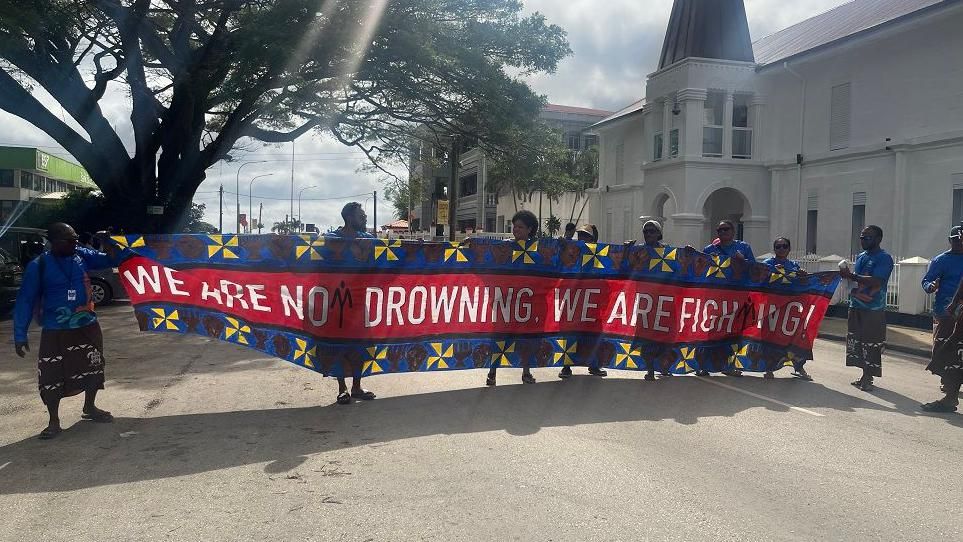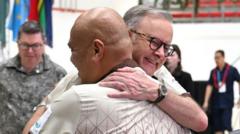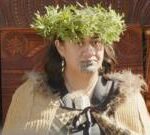
The Tongan capital Nuku’alofa was buzzing during the Pacific Islands Forum
Tonga’s sleepy capital Nuku’alofa was buzzing last week as leaders from across the Pacific region descended upon it for the annual Pacific Islands Forum (PIF) meeting.
Every so often, a police escort would speed through its streets, sirens blaring. On the bonnet of the cars, small flags identified the foreign delegations. China and Taiwan were visible, as well as the Union Jack and the United Nations.
All of them only participated as dialogue partners or observers. But they made a lot of noise. Their security detail was bigger than those of most of the 18 PIF members, save perhaps New Zealand and Australia. Tonga’s Royal Palace looked understated in comparison with only a sole guard looking after the King, according to sources.
Throughout the week, diplomats called the meeting fascinating – but the underlying concern is that the interest by these delegations is not necessarily in line with what PIF leaders or its people want.
The PIF is made up of 18 members – mostly Pacific Island nations as well as Australia and New Zealand – but delegations from across the world also attend, keen to play a role in the region, which is assuming greater geopolitical significance.
The big players are no longer just Australia and the US. China is a rising power in the Pacific and one that causes ructions.
Nuku’alofa has almost buckled under the pressure of all this interest. Outside one of its top hotels, where the big delegations were staying, there was a billboard looking for staff – declaring “no experience necessary – all positions”.
Inside the hotel, another notice warned that Tonga was facing a scarcity of skilled workers and therefore couldn’t service the general public during the forum.
It was a pertinent reminder of the “brain drain” that many Pacific nations face as their people head to Australia and New Zealand for a better future.
At the forum itself, Australia scored a victory quite early on when it announced a A$400m ($268m; £204m) Pacific Policing Initiative that aims to set up a police training facility in Brisbane and four centres across the Pacific. It will also train regional officers to be deployed across the region for major disasters or big events.
No sooner than the plan had been announced, it was eclipsed by a “hot mic” moment. Prime Minister Anthony Albanese was caught on camera calling the deal “a cracker” in a conversation with US Deputy Secretary of State Kurt Campbell. In a conversation he didn’t think was being filmed, he even joked with Mr Campbell about going “halfsies on the cost”.
It was an awkward gaffe that made it pretty clear that the policing initiative was a “win” against China’s growing influence in the region – 1-0 to Australia and its friends.
That Mr Albanese’s remarks were made in the auditorium that was built by the Chinese makes the competition all the more relevant. Chinese influence on the island is clear. Next to the auditorium is a large patch of land that holds the Royal Tombs, which has now been boarded up with big signs on the outside saying a renovation is being carried out with the help of China Aid. It’s a similar story across the Pacific.
But the conversation also backed up reservations made by Vanuatu’s Prime Minister and the head of the Melanesian Spearhead Group that the policing initiative could be seen more about cutting out China than focusing on the benefits for the Pacific Islands.
China’s growing influence in the region is clearly visible
Mr Albanese’s “cracker” comments weren’t the only controversy last week. In the final communique issued by PIF leaders on Friday afternoon, there was a reaffirmation of a 1992 agreement allowing Taiwan to play a role in forum leaders’ meetings. The communique was then removed and put up again, removing the reference to Taiwan. That then led to accusations that PIF leaders had given in to pressure from China although they suggested it was in fact an administrative error.
Of the 18 countries in the Pacific Islands Forum, just three have diplomatic relations with Taiwan. While China is a “dialogue partner’” Taiwan is a “development partner”, which is a step down in importance.
What all these arguments show is the very real competition that is hotting up in the Pacific. Everyone wants to come to the PIF because everyone wants a piece of the region.
The thing is, while superpowers fight it out for relevance, so too do the Pacific Islands. There’s a real emphasis on making sure that those who participate in this forum do so in the Pacific way – and for the benefit of people in the Pacific.
A recent report by the Lowy Institute, external found that strategic rivalry can at times forget the needs of people.
“Many of these economies are struggling to meet basic development needs,” according to the report entitled ‘The Great Game in the Pacific islands’.
“Larger powers often prioritise projects that deliver strategic gains such as telecommunications, ports and military facilities, or political dividends such as stadiums and convention centres, over less visibly impressive projects.”
PIF leaders say it is harder to get funding for climate change than security
On the penultimate day, leaders went on a retreat on the island of Vava’u. Meanwhile in Nuku’alofa, side events carried on. One was on the Pacific Resilience Facility, the first Pacific-led climate and disaster resilience financing fund whose headquarters will be in Tonga.
Attending the event were ministers and diplomats from members including Tonga, Tuvalu and Australia. There was great pride in the fund with expectations that this could be the answer to supporting climate change concerns across the region. Australia has been the biggest donor so far, with A$100m. The US, China and Saudi Arabia have also contributed but the fund still only has US$137m in total – that’s a long way from their target of US$500m by 2026 and a long-term goal of US$1.5bn.
“I think it’s harder to get funding for climate change,” Paulson Panapa, Tuvalu’s Minister for Foreign Affairs, Labour and Trade told the BBC. “We want all donors to treat both as very important just like it’s important to us.
”The Pacific Islands are small but in many ways they are mighty. These nations sit in an ocean that accounts for a third of the world’s surface area – what happens in their waters – politically, economically, diplomatically will shape the future of the world – both for good and bad.”






